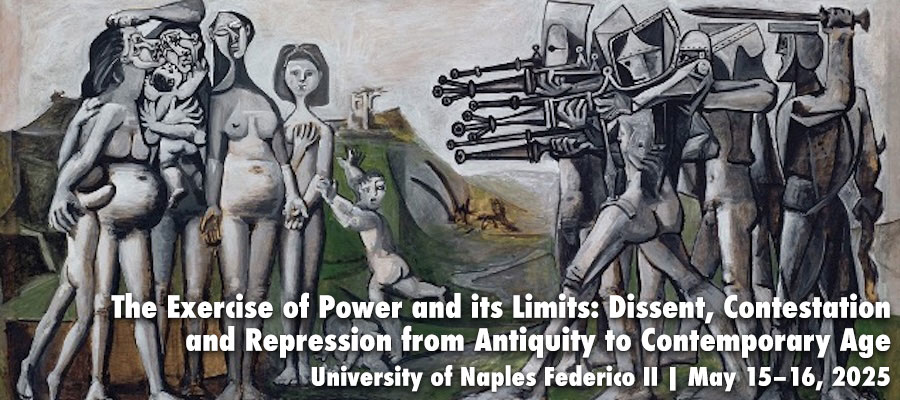The Exercise of Power and its Limits: Dissent, Contestation and Repression from Antiquity to Contemporary Age, University of Naples Federico II, May 15–16, 2025
The Department of Humanities of the University of Naples Federico II - in collaboration with the PhD programs in “History, Archaeology and History of Art” and “Historical Studies” - promotes the II International PhD Student and Researcher Conference, entitled The Exercise of Power and its Limits: Dissent, Contestation and Repression from Antiquity to Contemporary Age.
The conference focuses on the several questions and investigative approaches raised not only by the power and its maintenance, but also by the multifaceted forms of dissent and contestation. The fields of inquiry range from history and archaeology to history of art and literature through all the ages. The objective is to create, in an interdisciplinary framework, an opportunity for debate in order to develop new research perspectives on the topic.
The concept of power intersects numerous historical dynamics, thus influencing traditions, institutions,
material culture and artistic expressions. Indeed, power is closely linked to the manifestation and repetition of shared practices in the alveus of social, political and cultural phenomena, which in turn contribute to the creation, modification and replacement of further forms of both consensus and repression. As an operational concept, power, in its social, geographical and political declination, elaborates several ways of cultural representation and self-representation, whereof traces and testimonies remain in every human activity.
In light of these aspects, the conference aims to highlight the relevance, in the fluidity of contemporary society, of a historical discussion on the language of power, which, from Antiquity to Contemporary Age, captures the influences and conditioning of domination in the peculiarities of the historical-political path, cultural productions and socio-economic relationships. Perusing the strength and limits of power leads, therefore, both to a new problematisation of its legitimacy and to the analysis of the different forms of subversion and resistance to a centralised control.
Below the, although non-exclusive, lines of investigation are:
- Commission, self-representation and symbolic representation of power
- Urban spaces and places of power
- Production of sources as a tool for asserting power between authenticity and falsification
- Research and organisation of consensus
- Forms of legitimation and delegitimation of authority
- Negotiated and delegated power
- Damnatio memoriae and censorship policies: the power censoring power
- Telling the truth as an act of revolt: parrhesiastic discourse and practice
- Religions and political powers between conflicts and integration
- Economic or monetary policies as instruments of affirmation and coercion
- Dominating otherness: from the conflict of civilisations to racial suprematism
- Espionage, conspiracy and revolt: the subversive ways to power
- Propaganda, control and circulation of ideas: power between mystification and demystification
- Gender and political power: from repression to inclusion
The Call is addressed to PhD students in historical, archaeological, historical-artistic and philological-literary sciences and researchers in the same fields achieving the title no more than 5 years ago.
